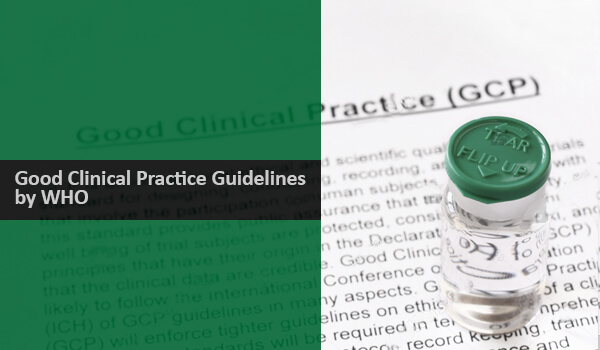
Good Clinical Research Practice (GCP) is an established international ethical and scientific quality standard process for the design, conduct, performance, auditing, monitoring, recording, analysis, and reporting of clinical studies. GCP ensures that the reported data and results are credible and accurate, and the rights integrity and confidentiality of study subjects are respected and protected. All the stakeholders must adhere to the GCP standards including research subjects, sponsors, investigators, contract research organizations (CROs), site staff, ethics committees, and regulatory authorities.
The GCP is established with the following aims:
Compliance of GCP assures public that the safety,rights and well-being of human subjects involved in research are protected and are consistent with the principles stated in the Declaration of Helsinki and other internationally recognized ethical guidelines.
Declaration of Helsinki (1964) was developed as a statement of ethical principles to guide physicians and other participants in medical research involving human subjects.
The other foundations for the ethical conduct of clinical research include:
WHO organized a ‘Scientific Group on Principles for Clinical Evaluation of Drugs’ in 1968 and then in 1975 to review and formulate principles and guidelines for clinical evaluation of drugs, new indications or dosage forms for marketed drug products and new combination products, and covering all aspects of drug development.In 1995,the WHO published ‘Guidelines for good clinical practice for trials on pharmaceutical products’ based on these reports.
There are 14 principles of WHO GCP and are summarized as follows:
Principle 1 –Ethical Conduct: All clinical trials must adhere to basic ethical principles which have their origin in the Declaration of Helsinki, namely equal importance for persons, beneficence, and justice, permeate all other GCP principles.
Principle 2 –Protocol: A detailed, clear protocol including background, rationale, objective(s), design, methodology, statistical considerations, information, and organization of a trial should be laid out for every clinical research involving human subjects and comply with scientific standards.
Principle 3 – Risk Identification: Beforea study/trial is initiated, all foreseeable inconveniences and risks should be assessed against the estimated benefit(s)for the individual trial subject and society. A proposed clinical trial should be supported by sufficient non-clinical and clinical information for source of information, knowledge of literature, and on adequate lab, and where applicable, animal experimentation.
Principle 4: Benefit-Risk Assessment: Trial with human subjects should be initiated and continued only if the predicted benefits outweigh the risks for the individual and society. The safety and well being of the trial subjects should be considered most important over the interest of science and society.
Principle 5 – Review By IEC/IRB:A protocol review of a clinical trial involving humans,should be submitted for consideration, guidance, evaluation, comments, and approval by specially appointed independent ethics committee/institutional review board (IEC/IRB).
Principle 6 – Protocol Compliance: Research with humans should be well-conducted in compliance with the protocol after approval by IEC/IRB. Any deviation or changes of the protocol shouldn’t be applied by the investigator without the sponsor’s agreement and documented approval/favorable opinion by IEC/IRB.
PRINCIPLE 7 – Informed Consent: A freely provided informed consent from each human subject before participation in any clinical trial should be obtained in compliance with the national culture(s) and requirements. The subjects should volunteer as informed participants. If giving informed consent is not possible for any subject, a legally authorized representative should give permission,by applicable law.
Principle 8 – Continuing Review/Ongoing Benefit-Risk Assessment: Clinical trials having humans as research subjects should be continued only if the benefit-risk assessment remains favorable. The sponsors should ensure a process to assess and evaluate the drug development continuously during the clinical trial. The ethics committee should conduct reviews during the research and monitor its progress.
Principle 9 – Investigator Qualifications: On behalf of the trial subjects, the decisions and medical care should be made by a qualified and duly licensed medical professional, i.e., physician or, when appropriate, a dentist.
Principle 10 – Staff Qualifications: Every individual who is involved in directing a trial must be qualified by training, education, and experience to perform their respective task. This includes the investigator and his/her supporting staff to assist him.
Principle 11 – Records: All the information during the clinical trial should be recorded, handled, and stored in a way to allows accuracy in its interpretation, reporting, maintenance, and verification.
Principle 12 –Confidentiality/Privacy: The confidentiality of records that could identify subjects must be protected, respecting the privacy and confidentiality rules in compliance with the applicable regulations This is done to safeguard the integrity of subjects.
Principle 13 – Good Manufacturing Practice (GMP): Manufacturing, handling, and storage of investigational product(s) should be in accordance with applicable GMP and should be used in accordance with the approved protocol.
Principle 14 – Quality Systems: Systems with procedures that assure the control assure and improve the quality of every aspect of the clinical trial must be implemented.
Turacoz Healthcare Solutions understands and abides by the GCP. We aim to deliver the best of the information about clinical research. Turacoz is a medical communications company, which offers services to healthcare professionals in clinical research, regulatory writing, publication writing, medico-marketing writing, and support for conducting medical advisory board meetings.
If you have any queries, email us at [email protected].
[/et_pb_text][/et_pb_column][/et_pb_row][/et_pb_section]